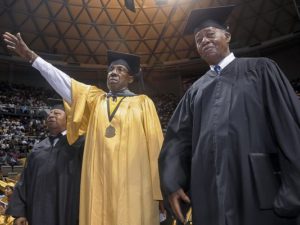
(From left) St. John Dixon, James McFadden and Joseph Peterson wave after receiving honorary degrees from Alabama State University — the same school that expelled them for their activism. (Photo by David Campbell/AS)
It’s been a long time coming, but the Alabama State Board of Education finally expunged the records of nine Alabama State College students who were expelled for their civil rights activism nearly 58 years ago.
Joseph Peterson, 83, was among the group of students booted from the campus, known today as Alabama State University, after taking part in a lunch counter sit-in at a whites-only eatery in the basement of the Montgomery County courthouse in 1960, USA TODAY reported. A few faculty members also found themselves jobless after participating in the protest.
To this day, Peterson says he doesn’t regret his actions.
“It was time for America to change,” the Alabama man recalled. “You have to take a stand for something.”
Earlier this month, the state’s education board cleared the records of Peterson and eight others who protested alongside him and offered them an apology, calling the state’s prior actions “unjustified and unfair.”
The expelled ASU students “represent a time in the history of the State Board that must be acknowledged and never repeated …,” former interim state superintendent of education Ed Richardson wrote in a May 10 letter to ASU President Quinton Ross. “I regret that it’s taken 58 years to correct this injustice. I can only hope that this action will provide a modicum of comfort to the people affected.”
Ross lauded the board’s decision and described the former student activists as “national heroes who deserved to have their records expunged.” The records of the fired faculty members were also wiped clean.
James McFadden, one of the expelled students, told USA TODAY the apology has been long-awaited and said he hopes to see other states follow Alabama’s lead.
“If you’re wrong … you should try to do something about it,” said McFadden, 78. “That’s why I think Alabama should do it and every other state, city and county should do the same thing for every form of injustice that they have done.”
Peterson, McFadden and their friends weren’t the only ones who faced punishment for their activism, however. According to the newspaper, other Black students across the South were kicked out of school for participating in civil rights protests during the ’60s and early ’70s — even those who attended historically Black colleges and universities.
Dorie Ladner said she and her sister was threatened with expulsion from Jackson State College in 1961 if they marched alongside Tougaloo College students who were trying to desegregate a library in Jackson, Miss. They demonstrated anyway and later enrolled at Tougaloo.
“I knew that if I came back (to Jackson State) I wouldn’t be welcomed,” Ladner said.
Derryn Moten, the man who helped spearhead the effort to get the records of the expelled ASU students cleared, argued it’s never too late to apologize to the civil rights veterans who’ve been wronged.
“These guys need to see and hear justice,” said Moten, who also serves as chairman of the Department of History and Political Science at Alabama State University. “These students were accused of being insubordinate. These students were accused of being disloyal to the state and disloyal to the Alabama State College. They were also accused of being unfit for a future teacher of Alabama — and all of that was a lie.”
ASU has since tried to right its wrongs. In May 2010, the university awarded Peterson, McFadden and fellow student St. John Dixon honorary degrees. Dixon v. Alabama, a suit filed by six of the expelled students, also became a landmark case in which an appeals court ruled in 1961 that colleges and universities must give students due process before they’re disciplined or expelled, USA TODAY reported.
“What happened to these individuals, these students and the faculty, in my mind, is a crime,” Moten said.


